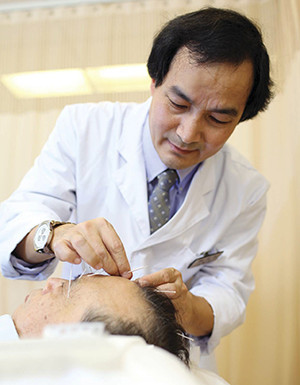Chinese Medicine Gaining Ground in Mental Health Treatment
In a recent presentation at CIIS on Chinese medicine and mental health, Dr. Zhang-Jin Zhang, a professor at the University of Hong Kong with an expertise in Chinese and Western medicine as well as neuroscience, made the case for using Chinese medicine to treat neuropsychiatric disorders.
Nearly, one in five American adults suffers from mental illness, according to the National Institute of Mental Health. Despite the fact that pharmacological treatments are expanding, and public stigmatization of mental health is decreasing, mental health issues are trending steadily upward.

Here are four key takeaways from Zhang’s presentation:
1. Chinese medicine offers effective and low-risk treatments for mental disorders.
The common Western pharmacological interventions for psychiatric issues—SSRIs, lithium, benzodiazepines, etc.—not only have low rates of efficacy, but also are accompanied by myriad side effects that can be more severe than the condition they aim to treat. Weight gain, muscle spasms and contractions, tremor, and addiction are just a few possible adverse effects.
Conversely, Chinese medicine interventions are at minimum, equal to, if not more effective, while allowing a patient to avoid these side effects: acupuncture and herbal medicine result in infrequent and mild side effects; likewise, other types of Chinese medicine interventions, such as dietary changes, tui na, qi gong, and tai qi, come with virtually no side effects at all.
2. Needles affect mental health via nervous system pathways.
How does sticking a needle in someone’s foot affect that patient’s mental health? Chinese medicine training provides metaphysical explanations for this mechanism, based on meridians and flow of qi and blood. But understanding this effect from a biomedical perspective can be more elusive.
Zhang has developed and proposed a concept that speaks to this issue: neural acupuncture unit (NAU). The term NAU refers to the distinct set of nervous tissue and “neuroactive components” (i.e. substances that influence the nervous system) that are in the area near where a needle is inserted. Acupuncture points are often located where NAUs are dense; thus, a single needle can modulate a great deal of nervous tissue and neuroactive components. These modulations are then communicated from the periphery to the brain using multiple pathways of the afferent nervous system. Imaging of the brain shows that these effects are sent into multiple brain regions, from the prefrontal cortex to the hypothalamus to the brainstem, thereby affecting pain sensation, cognition, mood, sleep, and a variety of other brain functions.
3. Acupuncture is the ancient version of modern-day brain stimulation therapy.
Brain stimulation therapy is one type of allopathic treatment for neuropsychiatric disorders, like depression or stroke. Started in the 1940s with electroconvulsive therapy, this type of treatment evolved throughout the years. The most recent form, transcutaneous vagus nerve Stimulation (tVNS), was developed in the 2000s, and uses electrical stimulation of the auricular branch of the vagus nerve to impact mood and brain function.
While this may sound a bit sci-fi-futuristic, the reality is that using impulses in the nervous system to modulate brain function has been around for thousands of years in the form of acupuncture.
For instance, Sun Si Miao’s “ghost points,” identified in the 7th century, are argued to be the earliest form of brain stimulation therapy and may share similar mechanisms of efficacy. Sun observed this collection of thirteen acupuncture points to improve mania and psychosis in his patients. Using the framework of NAUs to try to understand these points, Zhang shows that all correspond to areas of the body that have especially dense sensory tissue, which can explain the mechanism by which they are so influential on the function of the brain.
4. Start with the forehead.
As research shows, distal points all over the body can be used to modulate mood and brain function. One area of particular importance for the treatment of mental disorders is the insertion of acupuncture needles into the forehead.
Dense Cranial Electroacupuncture Stimulation (DCEAS) is one method. When applying DCEAS, the practitioner uses multiple acupuncture points on the forehead, and applies electro-stimulation to these points. Research conducted by Zhang and his colleagues shows DCEAS to be an effective treatment for depression, including postpartum and post-stroke depression.
Distal somatic needling has benefits as well. Zhang has also conducted research into a technique called Comprehensive Acupuncture Therapy (CAT), which combines the needling of points on the forehead with points on the body. According to his research, CAT has been shown to reduce “Chemobrain” and the neuropsychiatric sequelae of stroke.
The need for improved mental health treatment has become increasingly clear. What has also become clear, thanks to a growing body of research, including Zang’s, is that Chinese Medicine and its practitioners have an essential role to play in this effort.
Writing by ACTCM Alum Dr. Stephanie Albert
Dr. Stephanie Albert holds a Doctorate of Acupuncture and Chinese Medicine from the American College of Traditional Chinese Medicine in San Francisco, CA. She runs a private practice out of the Lotus Center in the Mission district of San Francisco, where she works with patients to address stress, insomnia, pain, women’s health issues, and other health complaints through acupuncture, herbal medicine and lifestyle modification. www.stephalbert.com
About American College of Traditional Chinese Medicine
American College of Traditional Chinese Medicine (ACTCM) has provided affordable, quality health care to the public and trained professionals in acupuncture, massage and Chinese medicine since 1980. In addition to its graduate curriculum, ACTCM offers continuing education, public education, community outreach and clinical services in acupuncture and herbal medicine. ACTCM has been the recipient of many awards for its curriculum, faculty and clinic, and has been voted “Best of the Bay” by both the San Francisco Weekly and the San Francisco Bay Guardian. ACTCM is accredited by the Accreditation Commission for Acupuncture and Oriental Medicine and is a private, nonprofit, 501(c)(3) tax-exempt organization